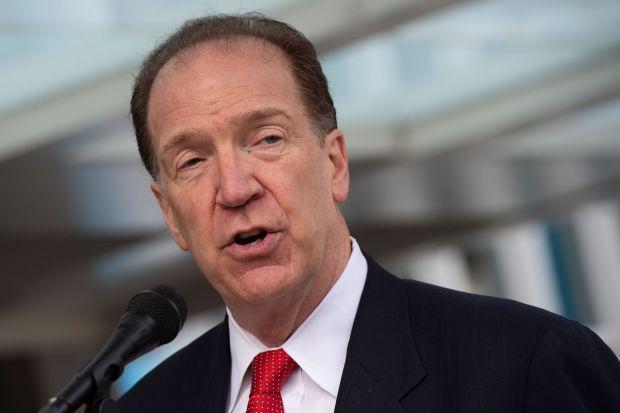Economy
World Bank: Africa’s per capita income to remain below 1% until 2030…nine in every 10 poor persons in the world is African

Okey Onyenweaku, Washington D.C, USA
The world Bank has expressed fear that poverty conditions in the Sub-Saharan African region of the world is worsening by the day as it projects its per capita income to remain below one percent in the years ahead.
The new World Bank President, David Malpass who resumed work on Monday Aril 9, 2019 revealed this at a press briefing during the ongoing World Bank/IMF 2019 Spring Meeting holding in World Bank Building on 1850, North West, Washington DC, USA.
Malpass said” On current trends, per capita income growth in Sub-Saharan Africa, as a whole, is now projected to stay below 1 percent until at least 2021, which elevates the risk of a further concentration of extreme poverty on the continent. Growth in median countries will also be weak.”
Explaining the global economic situation, he commented on the frightening situation: “This fact is extremely troubling, because it jeopardizes the World Bank’s primary goal of ending extreme poverty by 2030.”
He drew a graphic picture of an improved living standards of persons in the developed economies, while noting that, ‘’Globally, extreme poverty has dropped to 700 million at the last count, that’s down from much higher levels in the 1990s and 2000s. But the number of people living in extreme poverty is on the rise in Sub-Saharan Africa. On current trends, per capita income growth in Sub-Saharan Africa, as a whole, is now projected to stay below 1 percent until at least 2021, which elevates the risk of a further concentration of extreme poverty on the continent. Growth in median income will also be weak.”
According to him: “This fact is extremely troubling, because it jeopardizes the World Bank’s primary goal of ending extreme poverty by 2030. By 2030, nearly 9 in 10 extremely poor people will be Africans, and half of the world’s poor will be living in fragile and conflict-affected settings.”
He stressed that the situation calls for an emergency action by the countries themselves, and by the global community.
“Fortunately, the World Bank Group is financially strong. And with the capital package which was agreed to a year ago at the Spring Meetings, and which I was proud to support – the organization is becoming even more responsive, efficient, and effective. This week we at the World Bank Group have joined the IMF in welcoming our 189 shareholders to the Spring Meetings. I have already begun meeting with member countries and other stakeholders to discuss the challenges ahead, and to advance the broader global development agenda.”
He reiterated the world Banks resolve to work harder to ensure that the right attitude is adopted by governments to reverse the discomforting situations.
‘’Our mission is clear and important. The Bank’s role is particularly important in poorer countries, where the global economic slowdown that began last year hits people the hardest. Global growth lost momentum throughout 2018, falling 2.7 percent in the fourth quarter, down from 3.3 percent in the first quarter , Q1, based on World Bank calculations. The deceleration was seen in both advanced and developing economies, and it coincided with three other warning signs: waning structural reforms in major economies; financial stress in some large emerging markets; and elevated policy uncertainty globally.”, he said
Recently, Nigeria overtook India as the country with the largest number of people living in extreme poverty, with an estimated 87 million Nigerians, or around half of the country’s population, thought to be living on less than $1.90 a day.
This condition of the poor in Nigeria which economy grew by 1.9 per cent last year and with an exploding population growth is deeply worrying, industry analysts have said.


